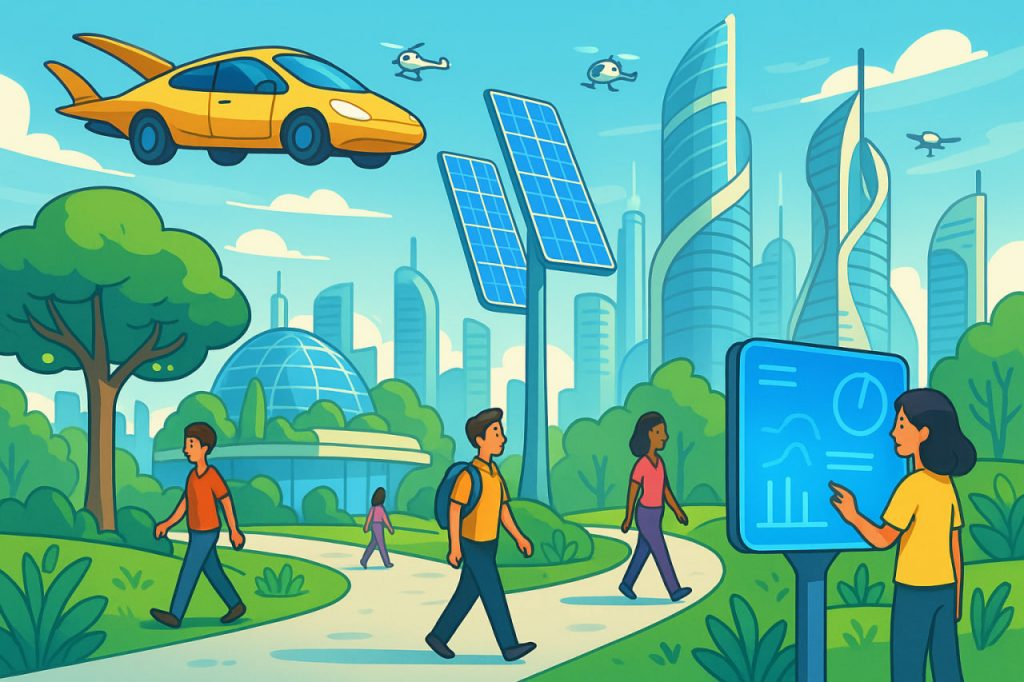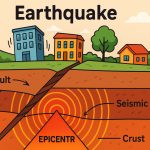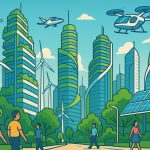The world of the future will be shaped by the intersection of technology, sustainability, and human creativity. As societies evolve, the boundaries between physical and digital reality will blur, transforming how we live, work, and connect. Artificial intelligence, renewable energy, biotechnology, and space exploration are already redefining what is possible. Yet the future will not only depend on machines—it will depend on the choices humans make today about ethics, cooperation, and the planet itself. The world of tomorrow will be both a reflection of our progress and a mirror of our values.
Smart Cities and Urban Evolution
Future cities will be living ecosystems powered by data, renewable energy, and human-centric design. Buildings will generate their own electricity through solar panels, vertical gardens will purify air, and sensors embedded in infrastructure will monitor traffic, pollution, and energy use in real time. Autonomous vehicles will reduce accidents and congestion, while smart waste systems will recycle materials automatically. Many megacities will expand vertically, creating interconnected towers that combine housing, agriculture, and recreation in one integrated environment. The goal will not be only convenience but also sustainability—balancing growth with ecological responsibility.
Artificial Intelligence and Human Collaboration
Artificial intelligence will become an integral part of daily life, transforming industries from healthcare to education. Intelligent assistants will help manage schedules, predict health issues, and optimize productivity. In the workplace, humans and AI will collaborate rather than compete, with machines handling repetitive tasks while humans focus on creativity and empathy-driven work. Ethical governance will be essential to ensure AI respects privacy, equality, and transparency. The challenge will be to use intelligence not as a replacement for humanity, but as an amplifier of its potential.
Biotechnology and Human Enhancement
Advances in biotechnology will revolutionize how we understand health and longevity. Personalized medicine based on genetic mapping will allow doctors to prevent diseases before they occur. Artificial organs, lab-grown tissues, and nanorobots could repair damaged cells at the molecular level. Some researchers envision “bio-augmentation,” where humans enhance their physical or cognitive abilities through implanted technology. However, these breakthroughs will also raise moral questions about access, inequality, and the definition of what it means to be human.
The Green Planet: Sustainability as a Way of Life
The future world must balance innovation with preservation. Renewable energy—solar, wind, tidal, and geothermal—will become the backbone of civilization. Carbon-neutral architecture, electric transportation, and large-scale reforestation will combat climate change. New materials like graphene and bioplastics will replace environmentally harmful substances. Circular economies will dominate, ensuring that waste from one process becomes the resource for another. Humanity’s survival will depend on building harmony between progress and the planet’s natural systems.
The Expansion into Space
As Earth’s resources become strained, space will represent both a scientific and existential frontier. Lunar bases, asteroid mining, and Mars colonies may become realities within the next century. Space tourism will evolve into interplanetary exploration, while satellite networks will create seamless communication across the globe. The search for life beyond Earth will redefine humanity’s understanding of its place in the universe. Yet the colonization of space will also test our ethics: will we repeat our terrestrial mistakes, or create a truly cooperative cosmic civilization?
Cultural and Social Transformation
Technology will not only change machines but also culture itself. The rise of virtual and augmented reality will blur the line between imagination and experience. Global communication will make cultures more interconnected, yet the preservation of local identity will become crucial. Education will be lifelong and personalized, empowering individuals to adapt to constant change. The concept of work, family, and even community will evolve, creating new definitions of meaning and belonging. The future world will demand emotional intelligence as much as technological literacy.
Interesting Facts
- Over 70% of the world’s population is expected to live in smart cities by 2100.
- Quantum computing may solve problems in seconds that today’s supercomputers would take millennia to process.
- Scientists are already testing artificial photosynthesis systems that could turn CO₂ into clean energy.
- The first generation of fully self-repairing materials is under development in several laboratories worldwide.
- NASA and private companies plan to establish permanent lunar bases within the next two decades.
Glossary
- Smart City – An urban area that uses digital technology to improve efficiency, sustainability, and quality of life.
- Artificial Intelligence (AI) – The simulation of human intelligence in machines designed to think and learn.
- Biotechnology – The use of biological systems and organisms to develop new technologies and products.
- Graphene – A single layer of carbon atoms arranged in a hexagonal lattice, known for extraordinary strength and conductivity.
- Nanorobot – A microscopic machine designed to perform precise tasks at a cellular level.
- Circular Economy – An economic model focused on minimizing waste and maximizing resource reuse.
- Quantum Computing – A new form of computing based on quantum physics that performs calculations far faster than traditional computers.
- Sustainability – The practice of meeting present needs without compromising future generations’ ability to meet theirs.
- Vertical Farming – The practice of growing crops in stacked layers to conserve space and resources.
- Terraforming – The process of modifying a planet’s environment to make it habitable for humans.


